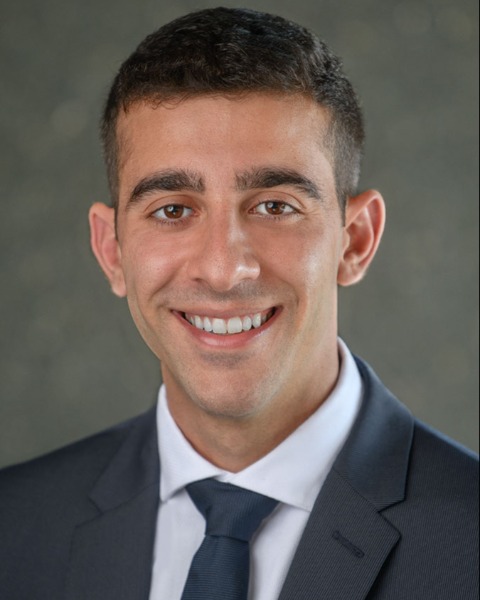Back
Poster Session C - Monday Afternoon
C0474 - Liquid Nitrogen Cryoablation Alone Is an Effective Palliative Treatment for Metastatic Esophageal Squamous Cell Carcinoma
Monday, October 24, 2022
3:00 PM – 5:00 PM ET
Location: Crown Ballroom

Daniel Aintabi, BSc, MSc, MD
St. Joseph Mercy Hospital Ann Arbor
Montreal, QC, Canada
Presenting Author(s)
Daniel Aintabi, BSc, MSc, MD1, Ann Saliares, BS, DO1, Elliot Berinstein, BSc, MSc, MD1, Naresh Gunaratnam, MD, FACG2
1St. Joseph Mercy Hospital Ann Arbor, Ypsilanti, MI; 2Huron Gastro, Ypsilanti, MI
Introduction: In 2012, Esophageal squamous cell carcinoma (ESCC) was reported as the most common type of esophageal cancer in the world. In patients with metastatic ESCC, the mainstay of palliative management includes radiation therapy and esophageal stenting. Endoscopic cryoablation has emerged as a minimally invasive treatment for malignant esophageal neoplasm. The administration of liquid nitrogen, achieving a temperature of -85℃, causes transient tissue ischemia and recruitment of immune cells resulting in localized tissue destruction. Most preliminary studies assessing cryoablation in esophageal cancer have demonstrated symptomatic improvement in esophageal adenocarcinoma. Few studies have assessed the use of cryoablation in ESCC. A prospective study conducted in China demonstrated cryoablation’s ability to achieve complete remission in patients with moderate to high grade ESC neoplasm. Here we present a case utilizing endoscopic liquid nitrogen cryoablation as palliative therapy in a symptomatic patient with metastatic ESCC.
Case Description/Methods: 82-year-old male former smoker with daily alcohol use presented with dysphagia and weight loss. CT scan of the chest revealed a mid-esophageal mass concerning for malignancy. Upper endoscopy demonstrated a large, fungating esophageal mass with partial obstruction (Panel 1A). Pathology revealed invasive poorly-differentiated ESCC. PET scan confirmed metastatic disease involving the right lung and paraesophageal, mediastinal, supraclavicular and right thoracic inlet lymph nodes. A multidisciplinary team offered palliative chemotherapy and radiation, which he declined. Due to worsening dysphagia and a 35lbs weight loss, he agreed to cryoablation (Panel 1B). He underwent an additional three sessions at two-months, three-months, and five-months for small areas of mucosal abnormalities (Panel 1C). He is four months out from treatment with improved dysphagia and stable weight.
Discussion: This case report provides further evidence for the use of cryoablation alone as a minimally invasive, palliative intervention in patients with ESCC. Previous studies have highlighted the effectiveness of cryoablation in improving dysphagia and quality of life in symptomatic patients. This case report provides endoscopic evidence of cryoablation’s ability to reduce tumor burden and achieve complete remission in ESCC. Cryoablation alone appears to be a safe and well tolerated palliative treatment for patients with metastatic ESCC.

Disclosures:
Daniel Aintabi, BSc, MSc, MD1, Ann Saliares, BS, DO1, Elliot Berinstein, BSc, MSc, MD1, Naresh Gunaratnam, MD, FACG2. C0474 - Liquid Nitrogen Cryoablation Alone Is an Effective Palliative Treatment for Metastatic Esophageal Squamous Cell Carcinoma, ACG 2022 Annual Scientific Meeting Abstracts. Charlotte, NC: American College of Gastroenterology.
1St. Joseph Mercy Hospital Ann Arbor, Ypsilanti, MI; 2Huron Gastro, Ypsilanti, MI
Introduction: In 2012, Esophageal squamous cell carcinoma (ESCC) was reported as the most common type of esophageal cancer in the world. In patients with metastatic ESCC, the mainstay of palliative management includes radiation therapy and esophageal stenting. Endoscopic cryoablation has emerged as a minimally invasive treatment for malignant esophageal neoplasm. The administration of liquid nitrogen, achieving a temperature of -85℃, causes transient tissue ischemia and recruitment of immune cells resulting in localized tissue destruction. Most preliminary studies assessing cryoablation in esophageal cancer have demonstrated symptomatic improvement in esophageal adenocarcinoma. Few studies have assessed the use of cryoablation in ESCC. A prospective study conducted in China demonstrated cryoablation’s ability to achieve complete remission in patients with moderate to high grade ESC neoplasm. Here we present a case utilizing endoscopic liquid nitrogen cryoablation as palliative therapy in a symptomatic patient with metastatic ESCC.
Case Description/Methods: 82-year-old male former smoker with daily alcohol use presented with dysphagia and weight loss. CT scan of the chest revealed a mid-esophageal mass concerning for malignancy. Upper endoscopy demonstrated a large, fungating esophageal mass with partial obstruction (Panel 1A). Pathology revealed invasive poorly-differentiated ESCC. PET scan confirmed metastatic disease involving the right lung and paraesophageal, mediastinal, supraclavicular and right thoracic inlet lymph nodes. A multidisciplinary team offered palliative chemotherapy and radiation, which he declined. Due to worsening dysphagia and a 35lbs weight loss, he agreed to cryoablation (Panel 1B). He underwent an additional three sessions at two-months, three-months, and five-months for small areas of mucosal abnormalities (Panel 1C). He is four months out from treatment with improved dysphagia and stable weight.
Discussion: This case report provides further evidence for the use of cryoablation alone as a minimally invasive, palliative intervention in patients with ESCC. Previous studies have highlighted the effectiveness of cryoablation in improving dysphagia and quality of life in symptomatic patients. This case report provides endoscopic evidence of cryoablation’s ability to reduce tumor burden and achieve complete remission in ESCC. Cryoablation alone appears to be a safe and well tolerated palliative treatment for patients with metastatic ESCC.

Figure: Panel 1. Upper endoscopic liquid nitrogen cryoablation of esophageal neoplasm. A) Initial upper endoscopy demonstrating large fungating mass in mid-esophagus with partial obstruction. B) Following completion of cryoablation treatment. C) Following three additional cryoablation sessions for treatment of residual disease.
Disclosures:
Daniel Aintabi indicated no relevant financial relationships.
Ann Saliares indicated no relevant financial relationships.
Elliot Berinstein indicated no relevant financial relationships.
Naresh Gunaratnam: Lean Medical LLC – Founder & CMO. Satya Health – Founder & CMO.
Daniel Aintabi, BSc, MSc, MD1, Ann Saliares, BS, DO1, Elliot Berinstein, BSc, MSc, MD1, Naresh Gunaratnam, MD, FACG2. C0474 - Liquid Nitrogen Cryoablation Alone Is an Effective Palliative Treatment for Metastatic Esophageal Squamous Cell Carcinoma, ACG 2022 Annual Scientific Meeting Abstracts. Charlotte, NC: American College of Gastroenterology.
